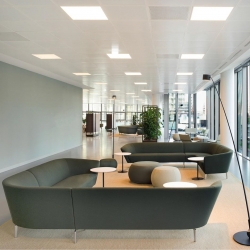To provide the best experiences, we use technologies like cookies to store and/or access device information. Consenting to these technologies will allow us to process data such as browsing behaviour or unique IDs on this site. Not consenting or withdrawing consent, may adversely affect certain features and functions.
The technical storage or access is strictly necessary for the legitimate purpose of enabling the use of a specific service explicitly requested by the subscriber or user, or for the sole purpose of carrying out the transmission of a communication over an electronic communications network.
The technical storage or access is necessary for the legitimate purpose of storing preferences that are not requested by the subscriber or user.
The technical storage or access that is used exclusively for statistical purposes.
The technical storage or access that is used exclusively for anonymous statistical purposes. Without a subpoena, voluntary compliance on the part of your Internet Service Provider, or additional records from a third party, information stored or retrieved for this purpose alone cannot usually be used to identify you.
The technical storage or access is required to create user profiles to send advertising, or to track the user on a website or across several websites for similar marketing purposes.
 The UK Government is bringing forward its target to relocate 22,000 civil service roles out of London. It comes as new figures today show that 16,061 roles have already been moved out of London, exceeding the commitment to relocate 15,000 roles by 2025 as part of the Places for Growth programme. Under the newly announced plans, Aberdeen, Darlington and Greater Manchester are to host second headquarters for major departments. Darlington is already the Treasury’s second headquarters.
The UK Government is bringing forward its target to relocate 22,000 civil service roles out of London. It comes as new figures today show that 16,061 roles have already been moved out of London, exceeding the commitment to relocate 15,000 roles by 2025 as part of the Places for Growth programme. Under the newly announced plans, Aberdeen, Darlington and Greater Manchester are to host second headquarters for major departments. Darlington is already the Treasury’s second headquarters.







 While millions of words have been dedicated to the expected changes in post-Covid workstyles – how will people work, where will they work, how will they be supported – very little has been said about their employers: companies and corporations. Yet the anticipated changes to work and the workplace raise questions about the role of the company. Is it one just half of a transaction between employer and employee? Or is it something more? Indeed, what is the role of the company in the modern economy? Is the nature of the company likely to change? The answers could have a greater impact on workstyles than the pandemic.
While millions of words have been dedicated to the expected changes in post-Covid workstyles – how will people work, where will they work, how will they be supported – very little has been said about their employers: companies and corporations. Yet the anticipated changes to work and the workplace raise questions about the role of the company. Is it one just half of a transaction between employer and employee? Or is it something more? Indeed, what is the role of the company in the modern economy? Is the nature of the company likely to change? The answers could have a greater impact on workstyles than the pandemic. 






![Gallup has published its 2023 Gallup Global Emotions report [registration] – a study of employee sentiment in the UK workforce](https://workplaceinsight.net/wp-content/uploads/2023/11/frustration-7505960_1280-250x250.png)

 A new poll of workplace leaders suggests there is an environment of unconscious fear in modern-day leadership, leading to toxic culture, stunted growth, performance and productivity, and decision inertia. The global study of 2,500 emerging leaders in corporate businesses by consultant
A new poll of workplace leaders suggests there is an environment of unconscious fear in modern-day leadership, leading to toxic culture, stunted growth, performance and productivity, and decision inertia. The global study of 2,500 emerging leaders in corporate businesses by consultant 


 This year’s London Real Estate Forum (LREF), held from 27-28 September at the Barbican, had a general air of optimism but tempered with the uncertainty of a general election in the next twelve months and elements of political and economic uncertainty globally. The day began with a state of the market discussion chaired by dRMM’s Sadie Morgan, with challenges facing the industry identified as the current valuation of the office market, the rate of housebuilding and the government’s lack of investment in infrastructure – the event coinciding with the furore over the cancelling of the northern part of HS2.
This year’s London Real Estate Forum (LREF), held from 27-28 September at the Barbican, had a general air of optimism but tempered with the uncertainty of a general election in the next twelve months and elements of political and economic uncertainty globally. The day began with a state of the market discussion chaired by dRMM’s Sadie Morgan, with challenges facing the industry identified as the current valuation of the office market, the rate of housebuilding and the government’s lack of investment in infrastructure – the event coinciding with the furore over the cancelling of the northern part of HS2. 












November 24, 2023
The final word on… workplace trends
by Mark Eltringham • Comment, Flexible working, Workplace design